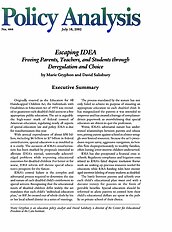Originally enacted as the Education for All Handicapped Children Act, the Individuals with Disabilities in Education Act of 1975 was intended to guarantee each disabled child access to a free appropriate public education. The act is arguably the high-water mark of federal control of American education, regulating nearly all aspects of special education law and policy. IDEA is due for reauthorization this year.
With annual expenditures of about $50 billion, including $6 billion to $7 billion in federal contributions, special education is as troubled as it is costly. The occasion of IDEA’s reauthorization has been marked by proposals intended to alleviate IDEA’s myriad, universally acknowledged problems while improving educational outcomes for disabled children. For better or for worse, IDEA reform will dictate special education’s prospects for the future.
IDEA’s central failure is the complex and adversarial process required to determine the size and nature of each disabled child’s entitlement to special services. Recognizing that the educational needs of disabled children differ widely, the act mandates that each child’s “individual education plan,” or IEP, be created out of whole cloth by his or her local school district in a series of meetings.
The process mandated by the statute has not only failed to achieve its purpose of ensuring an appropriate education to each disabled child. It has marginalized the parents it was intended to empower and has created a barrage of compliancedriven paperwork so overwhelming that special educators are driven to quit the profession.
Worse, IDEA’s adversarial nature has undermined relationships between parents and educators, pitting parent against school in a bitter struggle over limited resources. Because the act’s procedures require savvy, aggressive navigation, its benefits flow disproportionately to wealthy families, often leaving lower-income children underserved.
IDEA has also precipitated a financial crisis in schools. Regulatory compliance and litigation costs related to IDEA’s failed dispute resolution framework are soaking up precious resources needed for education, while IDEA funding rules have encouraged incorrect labeling of many students as disabled.
The battle between parents and schools over each child’s educational plan must end with a decisive victory for parents in the form of portable benefits. Special education should be reformed to allow parents to control how their child’s educational dollars are spent in the public or private school of their choice.

This work is licensed under a Creative Commons Attribution-NonCommercial-ShareAlike 4.0 International License.

